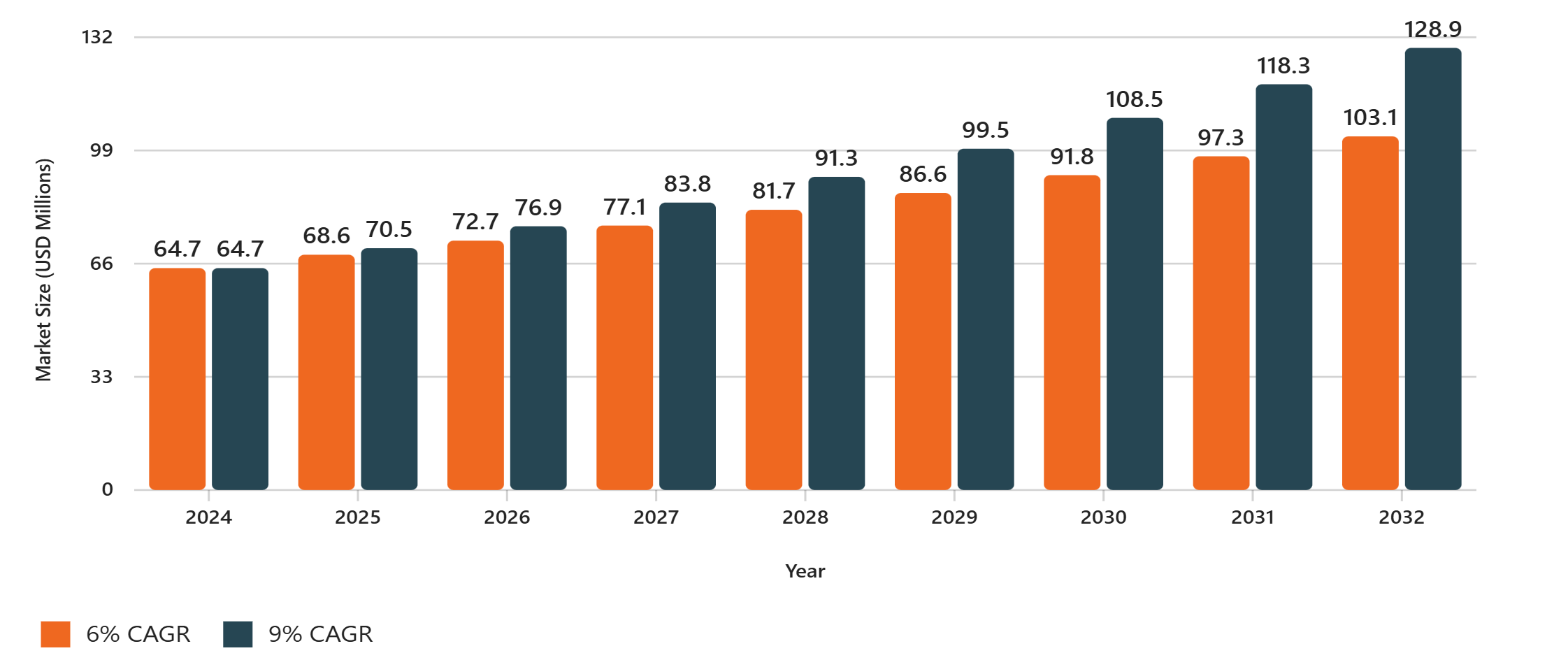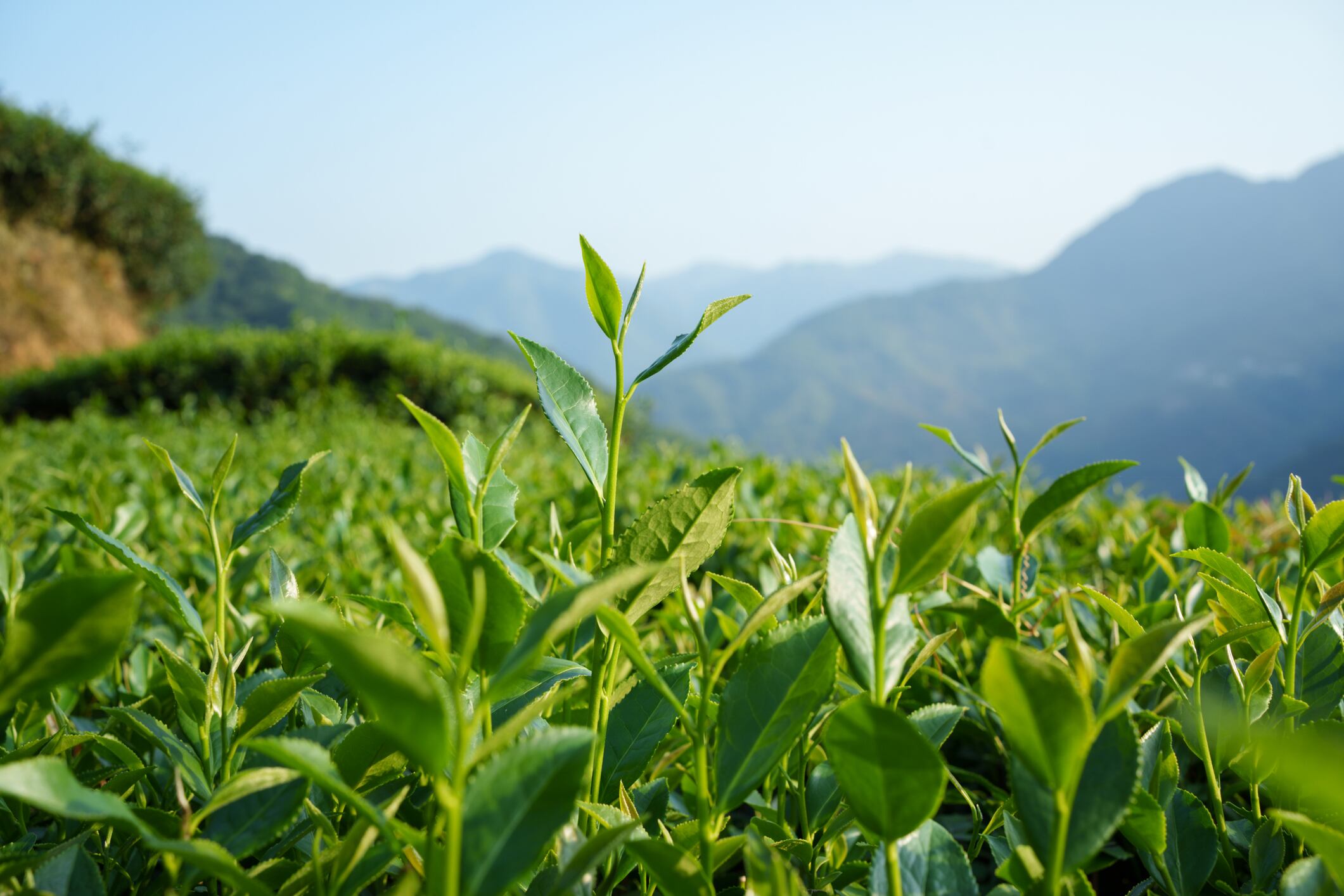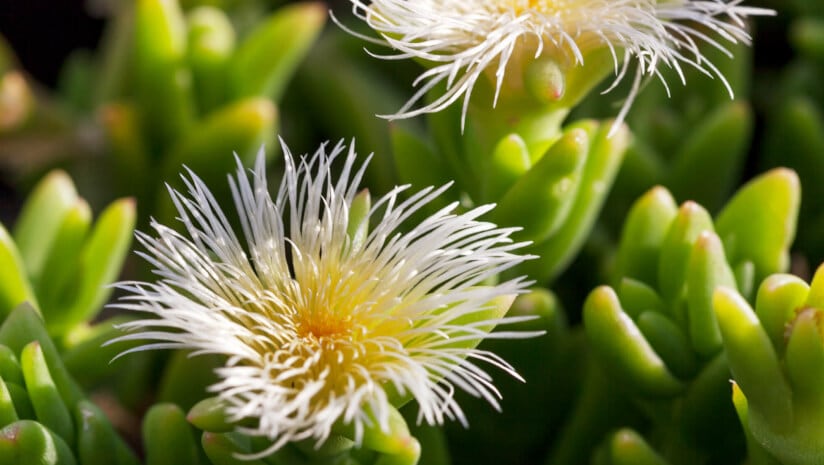In ancient Japan, samurai warriors consumed matcha at tea ceremonies before battle to stay focused and relaxed, as did Zen Buddhist monks before meditation, but the compound responsible for these sought-after effects was not discovered until centuries later.
Today, most estimates place the global L-theanine market between $55 to $75 million, but this figure rises significantly when vitamin and supplement sales containing L-theanine are factored in, according to market research insight firm SPINS.
SPINS reports that interest in L-theanine is spiking within the U.S. retail channel, valuing sales of supplements containing L-theanine at around $339 million (+7% sales growth YoY), with an additional $966 million (+78% sales growth YoY) coming from functional beverages.
“That brings the total U.S. retail impact tracked by SPINS to roughly $1.3 billion (+52% sales growth YoY), showing how L-theanine has expanded far beyond the supplement aisle into everyday beverage and grocery formats,” said Rahul Roy, senior retail insights manager at SPINS.
While the United States is emerging as the fastest-growing retail market, the Asia-Pacific region continues to dominate global L-theanine production and consumption, accounting for around two-thirds of total demand.
Asia’s dominance of the L-theanine market can be attributed to a combination of factors, such as agricultural advantages, a relaxed regulatory environment and a long history of cultural tea consumption.

Discovery and isolation of L-theanine
L-theanine was first discovered in 1949 by Japanese scientists at Kyoto University while investigating the chemical compounds responsible for green tea’s characteristic umami flavor.
Prior to this study, caffeine was known to account for 40% to 50% of the water-soluble nitrogen in tea leaves, but the chemical nature of the composition of the remaining components was largely unknown.
Using paper chromatography, the researchers separated the water-soluble nitrogen compounds and discovered a new component: ethylamine of glutamic acid. This was the first discovery of ethylamine in any form within the plant kingdom.
The compound was named theanine, derived from an older, now abandoned scientific name for the tea plant Thea sinensis (now known as Camelia sinensis).
A year later, scientists successfully isolated L-theanine from Gyokuro tea leaves via a hot water extraction process. The colorless needle-like crystals had a weak sugary taste and a slightly savory flavor profile, which the researchers believed to be responsible for green tea’s umami flavor.
They also discovered that tea leaves grown in the shade accumulated greater amounts of L-theanine, opening up high concentration formulation opportunities for this new ingredient.
After isolating the compound, Japanese researchers conducted toxicological studies to confirm its safety and found it to be non-toxic even at relatively high doses.
The Japanese Ministry of Health and Welfare approved its use in most food and beverage applications in 1964.
Health benefits of L-theanine: What does the research show?
Following its approval in Japan, researchers began investigating whether L-theanine might be responsible for the calming properties of green tea.
Initially working in rat models, they discovered that L-theanine could cross the blood-brain barrier and produce relaxing yet non-sedative effects.
In 1998, Japanese L-theanine manufacturer and supplier Taiyo conducted a study with eight female university students with varying levels of anxiety. After consuming a dose of 200 mg of L-theanine dissolved in 100 ml of water, the researchers observed an increase in alpha waves in the occipital and parietal regions of the brain, with a greater intensity in those with high anxiety.
This was the first study to suggest that L-theanine works by influencing neurotransmitters such as GABA to increase alpha brain wave activity. The study also reported a relaxing effect in people with anxiety, leading researchers to focus on its potential properties for mood and cognition.
Later studies found that L-theanine can improve focus, attention, concentration, learning performance and mental clarity, as well as reduce stress and improve sleep. For example, one recent study on Ethical Natural’s AlphaWave L-theanine found it significantly decreased perceived stress, improved sleep quality, and enhanced cognitive attention compared to placebo.
While most of the research is focused on L-theanine’s cognitive and relaxation effects, it has also been found to help control symptoms of premenstrual syndrome (PMS) and support mental recovery after physical exercise.
Indeed, one study showed that a 50 mg dose of L-theanine accelerated mental regeneration when taken post-workout, without affecting the body’s natural hormonal or cardiovascular recovery responses.

“Our research shows that intense exercise stimulates the brain and can delay relaxation and sleep onset, especially after late-evening training or competition,” said lead researcher Ralf Jaeger. “Supplementation with L-theanine helps the brain unwind more quickly, within just 30 minutes, supporting faster relaxation, better sleep, and the restorative recovery athletes need to perform again the next day.”
Despite these findings, a review published earlier this year by American and Italian researchers concluded that the science does not yet ‘match the hype’ behind this trending ingredient. Writing in Nutrition Research, the authors reported a lack of rigorous human clinical trial data, with results from existing studies often inconsistent.
“The available data on the biological properties of L-theanine are promising, but far too preliminary to unequivocally support many of the purported health claims,” they reported.
However, Cal Bewicke, founder and CEO of Ethical Naturals, a California-based ingredient supplier and manufacturer, said the review does not provide a complete overview of the available evidence.
“Most of the discussion and the references attached to [the review] discuss the properties and effects of green tea consumption, rather than purified L-theanine,” he said “A number of these studies are done with rats, using injectable materials. There is also some focus on anti-seizure effects and other medical uses and health claims that certainly require more research and don’t align with supplement claims and use.”
L-theanine is typically recommended at a maximum dose of 400 mg a day, but caution is advised when it is taken alongside some medications, according to Linda May-Zhang, PhD, vice president of science and innovation at Blue California, which manufactures the L-TeaActive-branded L-theanine.
“People using antihypertensive drugs should be cautious because of possible additive blood-pressure lowering,” she said. “Those on sedatives or hypnotics should consult a clinician, and clinicians often advise caution when L-theanine is used alongside stimulant medications.”
Producing L-theanine at scale
Though found naturally in green tea leaves and certain mushrooms, it is “virtually impossible” to extract and purify L-theanine from green tea at scale, Bewicke said.
“The problem with extracting L-theanine from green tea is that it only exists at around 5%, so to extract that 5% and exclude all of the other components of green tea is extremely expensive and not practical on a commercial basis at all,” he explained.
Instead, most companies use either chemical synthesis or microbial fermentation to produce L-theanine. The chemical synthesis process involves the reaction of glutamic acid derivatives with ethylamine, but often results in the production of L-theanine and the inactive D-theanine, which can be difficult to separate.
In contrast, Ethical Natural’s L-theanine is produced through a proprietary microbial fermentation process. This involves taking a base like sucrose and adding certain types of bacteria, such as Escherichia coli or Corynebacterium glutamicum. These bacteria are modified to express key enzymes which can synthesize L-theanine from amino acids. A post-fermentation liquid is then taken through a purification process, resulting in a high-purity extract, containing a minimum of 98% L-theanine.
These production methods, however, come with regulatory hurdles in some regions. For example, while L-theanine produced via fermentation or chemical synthesis is permitted in countries such as the United States and Japan, it is prohibited in others, such as European member states.
Under EU law, synthetic and fermented L-theanine is classified as a novel food and is therefore not permitted for use in food products or dietary supplements. In fact, the only form of L-theanine that is permitted in the EU is that which has been extracted from tea leaves.
“Nearly all of the purified L-theanine that is used in supplements today comes from fermentation, but in Europe, companies don’t want to say that their product is produced by fermentation because then they wouldn’t be allowed to sell it,” Bewicke said.
“There are a number of European companies that are claiming that their product is from green tea, but it’s not,” he added. “We’ve tested some of these products to see if there is any minute residue of green tea DNA and there is none—it comes from fermentation.”
While there is no requirement in Europe for ingredient suppliers and manufacturers to publicly state how they produce L-theanine, companies do have to provide their clients with sufficient information to confirm compliance and adequate labeling.
Interestingly, the EU’s Rapid Alert System for Food and Feed (RASFF) has not reported any recent compliance issues involving the use of synthetic or fermented L-theanine in dietary supplements. Instead, all reported issues have been associated with its inclusion in beverages.
“The primary issue is that L-theanine is considered an unauthorized novel food in the European Union for general use in foods and beverages, while it is considered not novel only if sourced from green tea and used in food supplements,” said food law expert Luca Bucchini. “The notifications almost exclusively concerned energy drinks and other non-alcoholic beverages imported from outside the EU.”
Japanese L-theanine supplier Taiyo has submitted a request for the authorization of L-theanine from fermentation with enzymatic action. If approved, this could lead to a crackdown on unauthorized forms on the market, Bucchini said.
“In theory, one could argue that L-theanine from fermentation is identical to the extracted kind for the purpose of the novel food regulation,” he added. “However, it seems that a key stakeholder has chosen the alternative path of authorization with data protection. Once authorized, if it all goes well, the holder of the authorization may try to ensure that unauthorized forms of theanine from fermentation are not placed on the market.”
Emerging consumers, formulations and categories
As consumer awareness and the body of scientific evidence grows, SPINS projects the U.S. L-theanine market to grow at a compound annual growth rate (CAGR) of 6% to 9% through to 2032, with the strongest momentum in functional beverages, nootropic blends and stress and sleep formulations. Insights from global online retailer iHerb further corroborate forecasts of sustained market momentum.

“L-theanine continues to hold a strong position in the dietary supplement market and has demonstrated steady growth over the past several years,” said Lan Belinky, senior director of house brands at iHerb. “At iHerb, we’ve observed consistent consumer interest in L-theanine products, both as standalone supplements and as part of combination formulas focused on stress support, mental clarity and cognitive balance.”
Alongside growing consumer interest, this market growth can also be attributed to modern day manufacturing processes which have made the ingredient cheaper to produce at scale, without compromising on quality.
According to Bewicke, Ethical Natural’s proprietary fermentation process means the company can sell L-theanine at half the price of previous market rates while maintaining high purity, making the ingredient more accessible to a mass market of consumers.
This growth can also be attributed to a growing number of scientific research papers substantiating the ingredient’s benefits.
Aligning with scientific research outcomes, Belinky said consumers are primarily turning to L-theanine to promote a sense of calm without drowsiness, as well as relaxation, mental focus and cognitive performance, especially during periods of elevated stress or workload.
Sleep is also becoming a sought-after benefit of L-theanine, according to Dr May-Zhang. This reflects a growing consumer demand for sleep solutions, with sleep topping the list of consumer health goals in a recent survey by Lumina Intelligence.
“L-theanine is mainly positioned for stress management, calm or relaxation, and calm focus when paired with caffeine,” she said. “The fastest growth is in sleep support, often as part of blends, and in active nutrition and sports performance products that aim for steady focus without jitters.”
Consumer demographics have also evolved over recent years, particularly within the active nutrition space, Belinky said.
“Historically, L-theanine was most popular among adults seeking stress relief and relaxation; however, the demographic has diversified substantially,” he said. “Today, we see increasing adoption across several groups, including professionals and students seeking support for focus and cognitive performance; active individuals and athletes who value L-theanine for promoting calm alertness during training or competition; and older adults who are wanting to maintain mental clarity and composure as part of healthy aging.”
This is reflected in SPINS data which shows that L-theanine buyers are primarily adults between the ages of 25 and 49. The company’s latest consumer survey showed that 12% of 25-to-34-year-olds and 22% of 35-to-49-year-olds purchased L-theanine in the past 12 months.
As consumer demographics have widened, so has the range of delivery formats. According to SPINS, gummies are emerging as a popular delivery format for L-theanine, while traditional forms such as powders and capsules, tablets and softgels have remained relatively flat or are declining.
“This clearly shows that consumers prefer alternative, easy-to-consume formats, a move from ‘pill fatigue’ toward everyday functionality through beverages and fun formats,” Roy said.
L-theanine’s inclusion in energy drinks, coffees, sports gels, pre-workout powders and other functional drinks further underscores this development.
“One of the most notable trends is L-theanine’s increasing presence in multi-functional and lifestyle-oriented formulations,” Belinky said. “It is now commonly incorporated into nootropic, energy and relaxation blends, highlighting its versatility in both wellness, active nutrition and calm/relaxation categories.”





